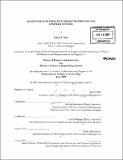An integrated strategic sourcing process for complex systems
Author(s)
Hsu, David T. (David Ta-wei)
DownloadFull printable version (9.808Mb)
Other Contributors
Leaders for Manufacturing Program.
Advisor
Donald Rosenfield and Daniel Whitney.
Terms of use
Metadata
Show full item recordAbstract
Aerospace firms continue to outsource increasingly complex components and systems for access to talent, lower costs, and global presence. In addition to strong competition from Airbus and other emergent companies, Boeing is faced with the challenge of reducing financial risk and placing work internationally to offset foreign sales obligations. The organization has recognized a need for an integrated framework to consistently make sourcing decisions that limits subjectivity and positions the company for continued success. This thesis is based on a six-month internship study with the Future Production System team based in Seattle, WA and it examines the strategic sourcing decision process at Boeing Commercial Airplanes. A discussion-based strategic sourcing process utilizing a holistic range of factors is proposed to test whether an expensive, complex, and integrated system like a composite airplane wing should be outsourced or if it should be designed and produced internally. This workshop-based strategy development process develops weighted factors through a structured, cross-functional process where multiple proposals can be evaluated based on their performance against a set of quantitative and qualitative factors such as cost, quality, flow, knowledge management, stability, and risk. The development of a baseline sourcing proposal for a composite airplane wing demonstrated the process. Careful assumptions were made and data collected to ensure a realistic scenario for a future single-aisle plane. The documented baseline wing sourcing strategy includes recommendations for proximity, design integration, and production responsibilities.
Description
Thesis (M.B.A.)--Massachusetts Institute of Technology, Sloan School of Management; and, (S.M.)--Massachusetts Institute of Technology, Engineering Systems Division; in conjunction with the Leaders for Manufacturing Program at MIT, 2009. Cataloged from PDF version of thesis. Includes bibliographical references (p. 85-88).
Date issued
2009Department
Leaders for Manufacturing Program at MIT; Massachusetts Institute of Technology. Engineering Systems Division; Sloan School of ManagementPublisher
Massachusetts Institute of Technology
Keywords
Sloan School of Management., Engineering Systems Division., Leaders for Manufacturing Program.